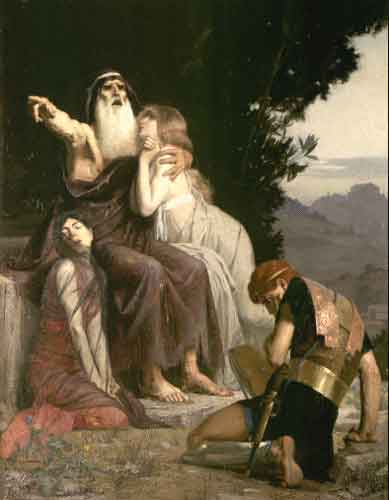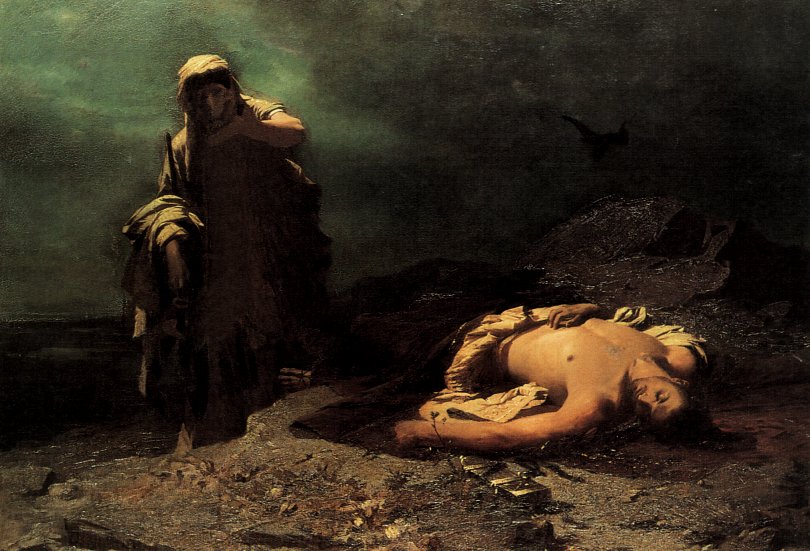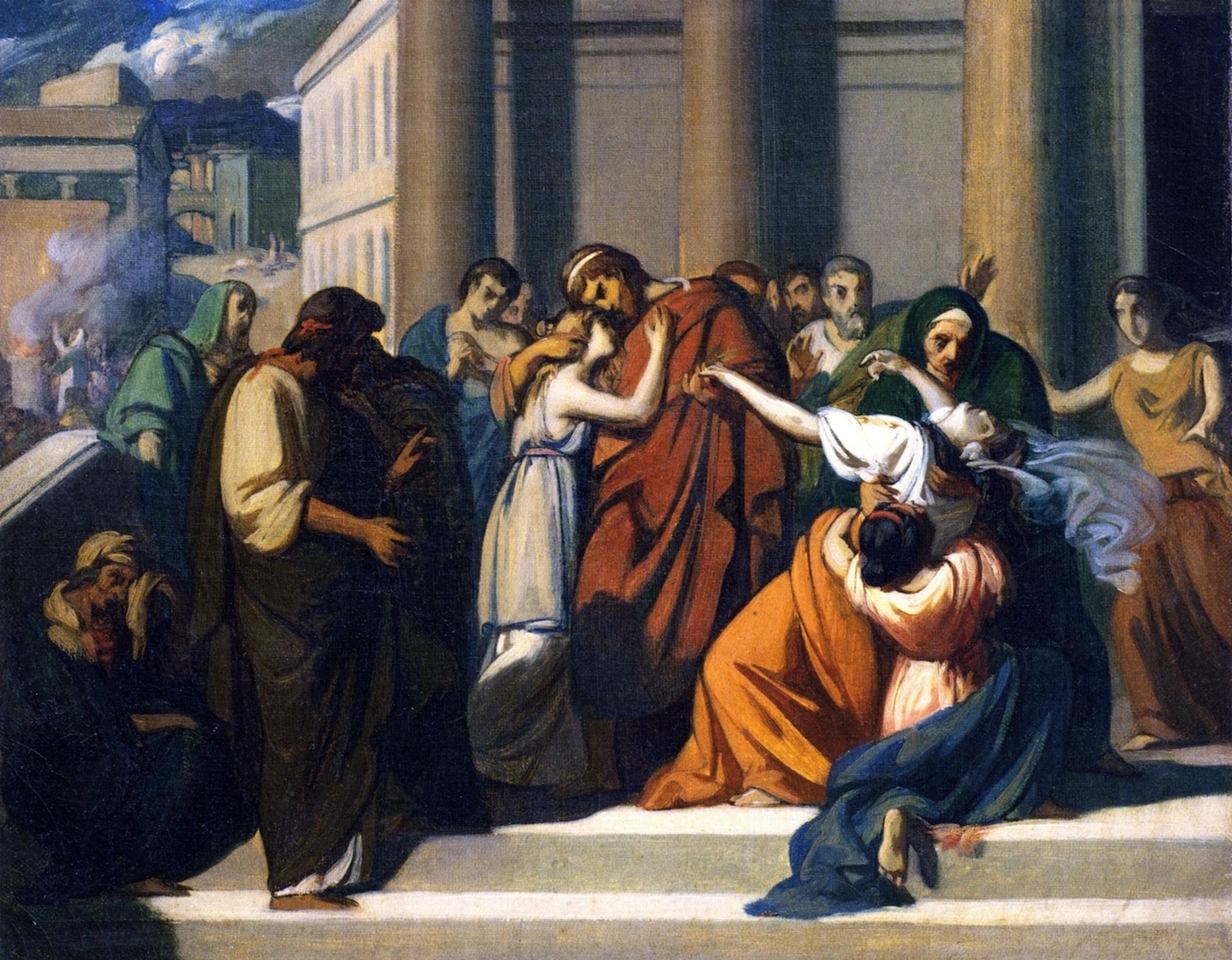|
Merope (Oedipus)
In Greek mythology, Merope (; grc-gre, Μερόπη) was a Queen of Corinth, and wife of King Polybus. In some accounts, she was called Periboea. Mythology The royal couple adopted a baby found by shepherds and named him Oedipus. To avoid the prediction of an oracle that he will kill his father and marry his mother, Oedipus goes in voluntary exile to Thebes. On his way, he has a quarrel with an old man and kills him, and for answering a riddle of the Sphinx at the entrance of Thebes gets to marry the queen dowager Jocasta. He fathers four children with Jocasta: Polynices, Eteocles, Antigone, and Ismene. He eventually finds out that the old man whom he killed on his way to Thebes was his own biological father, King Laius, husband of Jocasta, and that he fulfilled the prophecy. She was also like the grandmother to Oedipus’ children.Sophocles, ''Oedipus Tyrannus'' 776, 990. Note References * Apollodorus, ''The Library'' with an English Translation by Sir James George ... [...More Info...] [...Related Items...] OR: [Wikipedia] [Google] [Baidu] |
Greek Mythology
A major branch of classical mythology, Greek mythology is the body of myths originally told by the Ancient Greece, ancient Greeks, and a genre of Ancient Greek folklore. These stories concern the Cosmogony, origin and Cosmology#Metaphysical cosmology, nature of the world, the lives and activities of List of Greek mythological figures, deities, Greek hero cult, heroes, and List of Greek mythological creatures, mythological creatures, and the origins and significance of the ancient Greeks' own cult (religious practice), cult and ritual practices. Modern scholars study the myths to shed light on the religious and political institutions of ancient Greece, and to better understand the nature of myth-making itself. The Greek myths were initially propagated in an oral tradition, oral-poetic tradition most likely by Minoan civilization, Minoan and Mycenaean Greece, Mycenaean singers starting in the 18th century BC; eventually the myths of the heroes of the Trojan War and its after ... [...More Info...] [...Related Items...] OR: [Wikipedia] [Google] [Baidu] |
Polynices
In Greek mythology, Polynices (also Polyneices) (; grc, Πολυνείκης, Polyneíkes, lit= manifold strife' or 'much strife) was the son of Oedipus and either Jocasta or Euryganeia and the older brother of Eteocles (according to Sophocles' "Oedipus at Colonus"). When his father, Oedipus, was discovered to have killed his father and married his mother, he was expelled from Thebes, leaving his sons Eteocles and Polynices to rule. Because of a curse put on them by their father Oedipus, the two sons did not share the rule peacefully and died as a result, killing each other in battle for control over Thebes. Mythology Oedipus's curse In the ''Thebaid'', the brothers were cursed by their father for their disrespect towards him on two occasions. The first of these occurred when they served him using the silver table of Cadmus and a golden cup, which he had forbidden. The brothers then sent him the haunch of a sacrificed animal, rather than the shoulder, which he deserved. ... [...More Info...] [...Related Items...] OR: [Wikipedia] [Google] [Baidu] |
Sophocles
Sophocles (; grc, Σοφοκλῆς, , Sophoklễs; 497/6 – winter 406/5 BC)Sommerstein (2002), p. 41. is one of three ancient Greek tragedians, at least one of whose plays has survived in full. His first plays were written later than, or contemporary with, those of Aeschylus; and earlier than, or contemporary with, those of Euripides. Sophocles wrote over 120 plays, but only seven have survived in a complete form: ''Ajax'', ''Antigone'', ''Women of Trachis'', ''Oedipus Rex'', '' Electra'', '' Philoctetes'' and ''Oedipus at Colonus''. For almost fifty years, Sophocles was the most celebrated playwright in the dramatic competitions of the city-state of Athens which took place during the religious festivals of the Lenaea and the Dionysia. He competed in thirty competitions, won twenty-four, and was never judged lower than second place. Aeschylus won thirteen competitions, and was sometimes defeated by Sophocles; Euripides won four. The most famous tragedies of Sophocles feature ... [...More Info...] [...Related Items...] OR: [Wikipedia] [Google] [Baidu] |
Bibliotheca (Pseudo-Apollodorus)
The ''Bibliotheca'' (Ancient Greek: grc, Βιβλιοθήκη, lit=Library, translit=Bibliothēkē, label=none), also known as the ''Bibliotheca'' of Pseudo-Apollodorus, is a compendium of Greek myths and heroic legends, arranged in three books, generally dated to the first or second century AD. The author was traditionally thought to be Apollodorus of Athens, but that attribution is now regarded as false, and so "Pseudo-" was added to Apollodorus. The ''Bibliotheca'' has been called "the most valuable mythographical work that has come down from ancient times." An epigram recorded by the important intellectual Patriarch Photius I of Constantinople expressed its purpose:Victim of its own suggestions, the epigraph, ironically, does not survive in the manuscripts. For the classic examples of epitomes and encyclopedias substituting in Christian hands for the literature of Classical Antiquity itself, see Isidore of Seville's ''Etymologiae'' and Martianus Capella. It has the follo ... [...More Info...] [...Related Items...] OR: [Wikipedia] [Google] [Baidu] |
Laius
In Greek mythology, King Laius (pronounced ), or Laios ( el, Λάϊος) of Thebes was a key personage in the Theban founding myth. Family Laius was the son of Labdacus. He was the father, by Jocasta, of Oedipus, who killed him. Mythology Abduction of Chrysippus After the death of his father Labdacus, Laius was raised by the regent Lycus but Amphion and Zethus usurped the throne of Thebes. Some Thebans, wishing to see the line of Cadmus continue, smuggled the young Laius out of the city before their attack, in which they killed Lycus and took the throne. Laius was welcomed by Pelops, king of Pisa in the Peloponnesus. According to some sources, Laius abducted and raped the king's son, Chrysippus, and carried him off to Thebes while teaching him how to drive a chariot, or as Hyginus records it, during the Nemean Games. Because of this, Laius is considered by many to be the originator of pederastic love, and the first pederastic rapist. This abduction is thought to be ... [...More Info...] [...Related Items...] OR: [Wikipedia] [Google] [Baidu] |
Ismene
In Greek mythology, Ismene (; grc, Ἰσμήνη, ''Ismēnē'') is the daughter and half-sister of Oedipus, daughter and granddaughter of Jocasta, and sister of Antigone, Eteocles, and Polynices. She appears in several plays of Sophocles: at the end of ''Oedipus Rex'', in ''Oedipus at Colonus'' and in ''Antigone''. She also appears at the end of Aeschylus' ''Seven Against Thebes''. In Sophocles Oedipus Rex Ismene is not named, but is seen at the end of Oedipus Rex as her father/brother laments the "shame" and "sorrow" he is leaving her and her sister to. Oedipus begs Creon to watch over them, but in his grief reaches to take them with him as he is led away. Creon prevents him from taking his daughters out of the city with him. Oedipus at Colonus Ismene appears in Oedipus at Colonus to tell her father of the situation in Thebes and the rivalry of his sons. She explains that Eteocles has taken the throne from Polynices and driven him out of the city. As a result of this, ... [...More Info...] [...Related Items...] OR: [Wikipedia] [Google] [Baidu] |
Antigone
In Greek mythology, Antigone ( ; Ancient Greek: Ἀντιγόνη) is the daughter of Oedipus and either his mother Jocasta or, in another variation of the myth, Euryganeia. She is a sister of Polynices, Eteocles, and Ismene.Roman, L., & Roman, M. (2010). The meaning of the name is, as in the case of the masculine equivalent Antigonus, "worthy of one's parents" or "in place of one's parents". She appears in the three 5th century BC tragic plays written by Sophocles, known as the three Theban plays, and she is the main protagonist of the eponymous tragedy ''Antigone''. In Sophocles The story of Antigone was addressed by the fifth-century BC Greek playwright Sophocles in his Theban plays: ''Oedipus Rex'' Antigone and her sister Ismene are seen at the end of '' Oedipus Rex'' as Oedipus laments the "shame" and "sorrow" he is leaving his daughters to. He then begs Creon to watch over them, but in his grief reaches to take them with him as he is led away. Creon prevents hi ... [...More Info...] [...Related Items...] OR: [Wikipedia] [Google] [Baidu] |
Eteocles
In Greek mythology, Eteocles (; ) was a king of Thebes, the son of Oedipus and either Jocasta or Euryganeia. Oedipus killed his father Laius and married his mother without knowing his relationship to either. When the relationship was revealed, he was expelled from Thebes. The rule passed to his sons Eteocles and Polynices. However, because of a curse from their father, the two brothers did not share the rule peacefully and died as a result, ultimately killing each other in battle for control of the city. Upon his death, Eteocles was succeeded by his uncle, Creon. Etymology The name translates as "truly glorious", from ἐτεός (eteós, “true”) + -κλῆς (-klês < kleos “glory”). It also appears in earlier form ''*Etewoklewes'' (). '' Tawagalawas'' is thought to be the Hittite rendition ... [...More Info...] [...Related Items...] OR: [Wikipedia] [Google] [Baidu] |
Jocasta
In Greek mythology, Jocasta (), also rendered Iocaste ( grc, Ἰοκάστη ) and also known as Epicaste (; ), was a daughter of Menoeceus, a descendant of the Spartoi Echion, and queen consort of Thebes. She was the wife of first Laius, then of their son Oedipus, and both mother and grandmother of Antigone, Eteocles, Polynices and Ismene. She was also sister of Creon and mother-in-law of Haimon. Life After his abduction and rape of Chrysippus, Laius married Jocasta. Laius received an oracle from Delphi which told him that he must not have a child with his wife, or the child would kill him and marry her; in another version, recorded by Aeschylus, Laius is warned that he can only save the city if he dies childless. One night, Laius became drunk and fathered Oedipus with Jocasta. Jocasta handed the newborn infant over to Laius. Jocasta or Laius pierced and pinned the infant's ankles together. Laius instructed his chief shepherd, Menoetes (not to be confused with Menoetes ... [...More Info...] [...Related Items...] OR: [Wikipedia] [Google] [Baidu] |
Corinth
Corinth ( ; el, Κόρινθος, Kórinthos, ) is the successor to an ancient city, and is a former municipality in Corinthia, Peloponnese, which is located in south-central Greece. Since the 2011 local government reform, it has been part of the municipality of Corinth, of which it is the seat and a municipal unit. It is the capital of Corinthia. It was founded as Nea Korinthos (), or New Corinth, in 1858 after an earthquake destroyed the existing settlement of Corinth, which had developed in and around the site of ancient Corinth. Geography Located about west of Athens, Corinth is surrounded by the coastal townlets of (clockwise) Lechaio, Isthmia, Kechries, and the inland townlets of Examilia and the archaeological site and village of ancient Corinth. Natural features around the city include the narrow coastal plain of Vocha, the Corinthian Gulf, the Isthmus of Corinth cut by its canal, the Saronic Gulf, the Oneia Mountains, and the monolithic rock of Acrocorinth ... [...More Info...] [...Related Items...] OR: [Wikipedia] [Google] [Baidu] |
Sphinx
A sphinx ( , grc, σφίγξ , Boeotian: , plural sphinxes or sphinges) is a mythical creature with the head of a human, the body of a lion, and the wings of a falcon. In Greek tradition, the sphinx has the head of a woman, the haunches of a lion, and the wings of a bird. She is mythicized as treacherous and merciless, and will kill and eat those who cannot answer her riddle. This deadly version of a sphinx appears in the myth and drama of Oedipus. Unlike the Greek sphinx, which was a woman, the Egyptian sphinx is typically shown as a man (an androsphinx ( grc, ανδρόσφιγξ)). In addition, the Egyptian sphinx was viewed as benevolent but having a ferocious strength similar to the malevolent Greek version. Both were thought of as guardians and often flank the entrances to temples. In European decorative art, the sphinx enjoyed a major revival during the Renaissance. Later, the sphinx image, initially very similar to the original Ancient Egyptian concept, was exported ... [...More Info...] [...Related Items...] OR: [Wikipedia] [Google] [Baidu] |
Ancient Thebes (Boeotia)
Thebes (; ell, Θήβα, ''Thíva'' ; grc, Θῆβαι, ''Thêbai'' .) is a city in Boeotia, Central Greece. It played an important role in Greek myths, as the site of the stories of Cadmus, Oedipus, Dionysus, Heracles and others. Archaeological excavations in and around Thebes have revealed a Mycenaean settlement and clay tablets written in the Linear B script, indicating the importance of the site in the Bronze Age. Thebes was the largest city of the ancient region of Boeotia and was the leader of the Boeotian confederacy. It was a major rival of ancient Athens, and sided with the Persians during the 480 BC invasion under Xerxes I. Theban forces under the command of Epaminondas ended Spartan hegemony at the Battle of Leuctra in 371 BC, with the Sacred Band of Thebes, an elite military unit of male lovers celebrated as instrumental there. Macedonia would rise in power at the Battle of Chaeronea in 338 BC, bringing decisive victory to Philip II over an alliance of Thebe ... [...More Info...] [...Related Items...] OR: [Wikipedia] [Google] [Baidu] |

.jpg)





